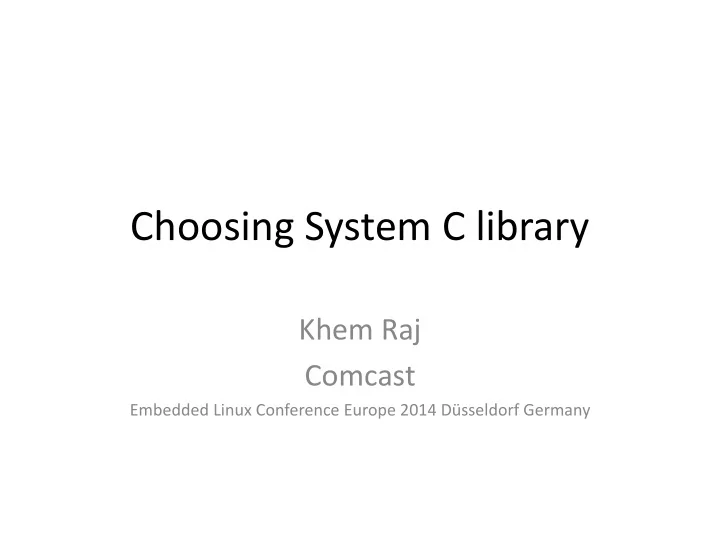

Choosing System C library Khem Raj Comcast Embedded Linux Conference Europe 2014 Düsseldorf Germany
Introduction “God defined C standard library everything else is creation of man”
Introduction • Standard library for C language • Provides primitives for OS service • Hosted/freestanding • String manipulations • Types • I/O • Memory • APIs
Linux Implementations • GNU C library (glibc) • uClibc • eglibc – Now merged into glibc • Dietlibc • Klibc • Musl • bionic
Multiple C library FAQs • Can I have multiple C libraries side by side ? • Can programs compiled with glibc run on uclibc or vice versa ? • Are they functional compatible ? • Do I need to choose one over other if I am doing real time Linux? • I have a baremetal application what libc options do I have ?
Posix Compliance • Posix specifies more than ISO C • Varying degree of compliance
What matters to you ? • Code Size • Functionality • Interoperability • Licensing • Backward Compatibility • Variety of architecture support • Dynamic Linking • Build system
Codesize • Dietlibc/klibc – Used in really small setup e.g. initramfs • Bionic – Small linked into every process • uClibc – Configurable • Size can be really small at the expense of functionality • Eglibc – Has option groups can be ( < 1M )
License • Bionic – BSD/Apache-2.0 • Musl - MIT • Uclibc – LGPL-2.1 • Eglibc/Glibc – LGPL-2.1 Assigned to FSF • Dietlibc – GPLv2 • Klibc – GPLv2 • Newlib – some parts are GPLv3
Compliance • Musl strives for ISO/C and POSIX compliance
No-mmu • uClibc supported No-mmu
Distributions • Glibc is used in majority of distribution – Fedora-like, RHEL, Debian-like, SuSE, Gentoo, Archlinux …. • Buildroot – Uclibc and glibc • OpenEmbedded – Uclibc/glibc/musl • Alpine – Uclibc/musl
Performance • Glibc has architecture optimized str/mem routines
Stability • Stable ABI – glibc,musl • Backward compatibility – glibc, musl • Symbol versioning – glibc • LSB compliance - glibc
Features • C99 Math library – glibc and musl • Posix threads – uclibc/glibc/musl • C11 TLS – uclibc/glibc/musl • Wide chars – uclibc/glibc/musl • Profiling – glibc • Debugging Features – glibc • Zoneinfo – glibc/musl
Features • Stack smashing Protection – uclibc/glibc/musl • Heap corruption Detection – musl/glibc
CPU Architectures • Glibc supports the widest range – ARM/MIPS/x86/SH/PPC/SPARC/Alpha/IA64/Micro blaze/s390 • Uclibc does support most of above except few. Eg. S390, x32 but then it supports ARC, AVR32 .. • Musl is getting architecture parity • Bionic arm/x86/mips
Recommend
More recommend